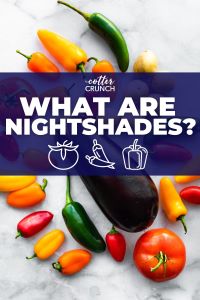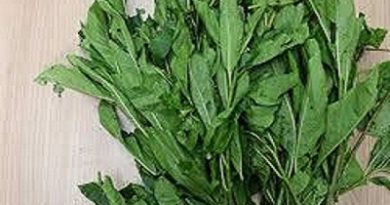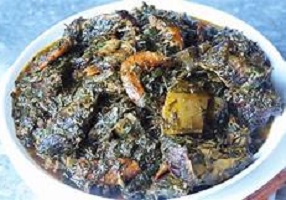What are Nightshade Vegetables? Are They Good for You
What are Nightshade Vegetables? Are They Good for You

Vegetables classified as nightshade include white potatoes, peppers, tomatoes, and eggplants.
Fascinatingly, they are members of the Solanaceae family, which also includes tobacco, belladonna, and mandrake, all of which are poisonous and not fit for human consumption.
However, even the edible nightshades we buy at the grocery store have trace levels of chemicals called alkaloids, such as solanine, which can be harmful in high concentrations.
Nutrition experts explain what you should know about nightshade veggies and if it’s healthy for you to eat them.
Table of Contents
What are nightshade vegetables?
There are almost 2,000 species in the nightshade food family, Solanaceae, and they all contain alkaloids.
Alkaloids are nitrogen-containing chemical substances. They offer plants a slightly bitter taste, which keeps insects and diseases away.
Tobacco belongs to the broad family of nightshades. Some nightshades are deadly, whereas others yield edible fruit.
When edible nightshades like potatoes and bell peppers have cousins like that, people start to question their safety.
They contain a chemical called solanine, which, in high enough concentrations, can result in convulsions and even death.
Another plant that is typically regarded as dangerous is the black nightshade (scientific name: Solanum nigrum).
In certain regions, black nightshade leaves, stems, and fully ripened berries are cooked and consumed.
Most nightshade plants are infamous because of the presence of specific substances called lectins (carbohydrate-binding proteins) and alkaloids (certain nitrogen-containing compounds of plant origin, such as solanine).
Many diets advise against consuming them.
These substances are said to exacerbate inflammatory responses in the body, which might exacerbate long-term medical disorders, especially arthritis.
These assertions are still purely anecdotal and unsupported by any scientific evidence.
The nutritional density of nightshade plants is extremely high.
It would appear that there is no rationale for removing them from your food regimen.
The Mediterranean diet, one of the healthiest eating regimens, highly recommends vegetables, especially those with a nightshade component.
Why are they called nightshade vegetables?
Although the origin of the term “nightshade” is unclear, some theories believe that it refers to the preference of these plants to grow and bloom during the night and in the shadows.
What are nightshade vegetables and why are they bad?
Solanine is found in nightshade crops like potatoes, tomatoes, and eggplants.
This material may make the intestines more porous and alter the gastrointestinal microbiota, which could further worsen arthritis-related inflammation.
List of nightshade vegetables PDF
Types of nightshade ~ List of nightshade vegetables and fruits
- Tamarillo
- Pepino
- Naranjilla
- Solanum sessiliflorum
- Australian desert raisin
- Banana pepper
- Habanero
- Tomato
- Aubergine
- Potato
- Capsicum
- Tomatillo
- Black nightshade
- Sweet And chili pepper
- Peruvian groundcherry
- Groundcherry
- Matrimony vine
- Lycopersicon
- Cherry Tomatoes
- Solanum macrocarpon
- Solanum aethiopicum
- Tabasco pepper
- Capsicum pubescent
- Box-thorns
- Yukon Gold potato
- Jalapeño Pepper
- Tobacco plants
- Henbanes
- Capsicum annuum var. acuminatum
- Poblano
- Australian desert raisin
- Naranjilla
- Solanum sessiliflorum
- Yukon Gold potato
- Cherry Tomatoes
- Groundcherry
- Tobacco plants
- Henbanes
- Box-thorns
- Poblano
- Jalapeño Pepper
- Capsicum annuum var. acuminatum
- Matrimony vine
- Tabasco pepper
- Capsicum pubescent
Substitutes for common nightshade vegetables
You will be depriving yourself of the nutrients nightshades offer if you choose to permanently eradicate them.
But there are lots of other foods available that offer similar nutrients and health advantages.
You can follow these tips to have a nutritious diet without consuming nightshades:
- Use sweet potatoes instead. Making the switch from white to sweet potatoes will give you far more vitamin A and help you avoid nightshades.
- Pesto is a great choice: green pesto is a fantastic substitute for tomato sauce in pizza and pasta dishes, and it shouldn’t contain nightshades.
If you’re attempting to cut out nightshades, stay away from red pesto since it typically contains tomatoes.
- Eat citrus fruits: citrus fruits such as oranges, tangerines, and grapefruits are also great providers of vitamin C, as are several nightshades.
- Consume extra leafy greens: Vegetables that are leafy green, such as kale, collard greens, and spinach, are excellent sources of dietary fiber, vitamins, and minerals.
Even if you’re not a fan of nightshades, you may reduce their alkaloid content by peeling your potatoes, eating less green tomatoes, and boiling them through.
Non nightshade vegetables
Here’s a list of vegetables that people often think are nightshades, but are not nightshades:
- Black pepper.
- Coffee
- Cucumber
- Garlic
- Zucchini
- Sweet potatoes.
- Spinanch
- Nightshade fruits
- Eggplant
- Tomatoes
- Potato
- Goji
- Tomatillos
- Bell peppers
- Chili pepper
- Cayenne pepper
- Grapefruit
- Peruvian groundcherry
- Pepino
- Peppers
- Groundcherry
- Naranjilla
- Blueberries
Benefits of nightshades
Plants that produce nightshades are especially beneficial to health.
In addition to offering fiber that is good for the gut, nightshade vegetables (some of which are fruits!) contain anti-inflammatory phytonutrients and antioxidants, such as anthocyanin (found in eggplant) and carotenoids (found in tomatoes, peppers, and potatoes).
They are also a great source of minerals and vitamins, such as potassium, magnesium, folate, vitamins A, E, and K.
There may be health benefits to other nutrients found in nightshades.
They have antioxidants in them that shield cells from stress-related cellular damage.
For instance, the antioxidant known as anthocyanin, which gives eggplant its purple hue, helps lower the risk of infections, diabetes, and cancer.
Tomatoes include the antioxidant lycopene, which may lower the risk of heart disease and several forms of cancer.
Vitamins A and C are only two of the many healthful minerals and vitamins found in nightshades.
An example of an item that provides the recommended daily allowance of vitamin C is a single bell pepper.
Negative effects of nightshades
These unfavorable side effects include heartburn, nausea, gas, bloating, diarrhea, and inflammatory joint pain.
Because each person’s digestive system is different, nightshade sensitivity can be caused by a variety of circumstances.
Research indicates that the true source of the intolerance, nevertheless, might be underlying problems.
Nightshade vegetables inflammation
Many people are aware that nightshades cause inflammation, and they can exacerbate inflammatory disorders such as arthritis and intestinal problems.
Numerous chemicals in nightshade vegetables have been demonstrated to occasionally induce inflammation.
Additionally, it has been demonstrated that nightshades’ saponins restrict nutrient absorption and impede digestion.
Lastly, capsaicin, an ingredient present in peppers that is sometimes thought to have anti-inflammatory qualities, has also been demonstrated to have the opposite effect.
Although not every meal will affect people in the same way, if specific symptoms and concerns are already a problem, it is reasonable to think about nightshade sensitivity
Nightshades and arthritis
A large portion of the opposition to nightshades stems from the notion that solanine induces inflammation.
Research, however, refutes this assertion. Indeed, nightshades are among the greatest vegetables for arthritis according to the Arthritis Foundation.
Additionally, the antioxidants found in peppers, tomatoes, eggplant, and potatoes are thought to have anti-inflammatory properties.
The elimination of nightshades from the diet has been associated with improved symptoms for certain arthritis sufferers.
Although nightshades don’t directly induce inflammation, they may exacerbate it in those who are predisposed to it, according to one theory explaining this.
If you think nightshades are bothering you, you can adhere to the guidelines for an elimination diet.
The main danger of skipping potatoes, peppers, and tomatoes is nutritional deficit, so make sure to replace them with other nutrient-dense veggies like sweet potatoes, leafy greens, and cauliflower.
If you make any dietary adjustments, especially if you’re receiving treatment for a medical issue, make sure to discuss them with your healthcare team.
Nightshades and solanine
The accumulation of solanine and the protein lectin is supposedly the reason why some people advocate for the exclusion of nightshade foods from the diet.
Opponents claim that this accumulation results in autoimmune disorder flare-ups, arthritis, Type 1 diabetes, leaky gut, inflammatory bowel disease, and harm to the gut.
It’s also claimed that solanine lowers the amount of calcium stored in bones.
Furthermore, investigations using animal cells in petri dishes have demonstrated that solanine can raise calcium ion concentrations, which initiate the process of cell death.
However, once more, these findings have not been replicated in human trials.
Are nightshade vegetables bad for you?
All things considered, there isn’t any conclusive proof that veggies that are nightshade are unhealthy.
These veggies might not be the greatest for those who have inflammatory and auto-immune diseases like inflammatory bowel disease or arthritis, according to some preliminary studies.
Can someone be allergic to nightshade vegetables?
Nightshade vegetable allergies are rare but possible, affecting vegetables including potatoes and tomatoes.
Nonetheless, rather than being allergic, some people may simply be sensitive or intolerant to particular foods.
Some of the signs of food intolerance are:
- A person who is allergic to a particular food may get anaphylaxis, a severe reaction.
- Eruptions of eczema
- Stomach ache
- Diarrheal
- Bloating
- Constipation
- Runny nose
- Breathing problems
- Wheezing
- Cramps in the stomach
- Palpitations headaches
- Skin that is flushed
- An itchy, raised red rash on skin that is lighter
- An itchy, raised rash on skin that is darker

Conclusion
People don’t need to worry about nightshades and can include these veggies in their diet if they don’t have any symptoms associated with them.
Most Americans consume far too little vegetables—let alone nightshades—to get even this dangerously high solanine content.
On the other hand, as any home cook worth their salt knows, you should never eat the green sections of potatoes.
This is because these green sections have a higher solanine concentration.
Since the green parts don’t taste very good, it doesn’t hurt to keep removing them when cooking potatoes.
Eat a wide range of veggies, not only nightshades, to ensure that you’re getting all the nutrients and health-promoting phytochemicals.
FAQs
What are the top 10 nightshade vegetables?
List of nightshade vegetables and fruits:
- Every bell pepper.
- Jalapenos
- Eggplant
- Every potato, minus the sweet potatoes
- Every tomato.
- Habaneros
- Tamarindo
- Totillos
What are nightshade vegetables to avoid?
- Asparagus, tomatoes, and eggplant are all nightshade veggies.
- The alkaloid solanine found in nightshades is poisonous when present in large amounts.
- Some claim that cutting out nightshades will help reduce autoimmune disorder flare-ups and arthritis pain.
Why are they called nightshade vegetables?
Different kinds of alkaloid chemicals, which are dietary elements that alter bodily physiology, are found in nightshade plants.
The term “nightshade” may have come from describing how these plants like to grow and bloom in the darkness and shade; however, its exact origins are unknown.
Is onion a nightshade vegetable?
Onions do not resemble nightshades. People frequently mistake them for it.
Onions, however, are rich in FODMAPs, so you might want to stay away from them if you have IBS.
Other foods that are not nightshades, despite popular belief, include zucchini and mushrooms.
Is okra a nightshade?
Okra is the main edible species in the genus Abelmoschus, which belongs to the family Malvaceae.
It’s not in the Solanaceae family so it is not a nightshade.
Is cucumber a nightshade?
Cucumbers are not nightshade vegetables, despite what the general public believes. Vegetables that belong to the Solanaceae family are referred to as nightshade vegetables, which also contain the entire family of flowering plants.
Cucumbers are members of the Cucurbitaceae (commonly known as cucurbits) family, which includes squash and gourds.
Is ginger a nightshade?
Nightshade spices typically impart a fiery flavor to dishes.
Spices that are not nightshade-related, such as horseradish, wasabi, ginger, and garlic, can nonetheless cause this feeling.
Is cabbage a nightshade?
The nightshade family includes eggplant, tomatoes, potatoes, peppers, and tomatillos.
Horseradish, cabbage, cauliflower, broccoli, kohlrabi, kale, turnips, radishes, mustard, collards, and rutabaga are members of the mustard family.
Is garlic a nightshade?
Essentially, garlic belongs to the Allium family, not the Solanaceae family, which includes nightshades like tomatoes and bell peppers, even though both have a reputation for being excellent culinary ingredients.
Who should not eat nightshades?
All things considered, there isn’t any conclusive proof that veggies that are nightshade are unhealthy.
These veggies might not be the greatest for those who have inflammatory and auto-immune diseases like inflammatory bowel disease or arthritis, according to some preliminary studies.
Is carrot a nightshade?
Nor are carrots on the list of vegetables associated with Nightshades.
Try substituting raw carrots or onions for peppers or other nightshade vegetables in recipes that call for them.
What are the effects of nightshade foods?
These unfavorable side effects include heartburn, nausea, gas, bloating, diarrhea, and inflammatory joint pain.
Because each person’s digestive system is different, nightshade sensitivity can be caused by a variety of circumstances.
Research indicates that the true source of the intolerance, nevertheless, might be underlying problems.
What are the health effects of nightshade vegetables?
Potatoes and tomatoes are examples of common foods high in nutrients that are considered nightshade vegetables.
On the other hand, others think they can cause immunological malfunction and inflammation.
Vegetables with a nightshade name are members of the Solanaceae family of plants.
Is Papaya a nightshade?
There is some name confusion: tree melons and papayas are similar, but thankfully have somewhat different looks.
Papayas are not nightshades.
Are apples a nightshade fruit?
Despite not being nightshades, cherries, apples, and sugar beets also have trace levels of glycoalkaloid.
Why avoid nightshade family vegetables?
Alkaloids are found in members of the Solanaceae plant family, including solanine, a naturally occurring pesticide.
Belladonna, sometimes known as the “deadly nightshade,” contains solanines that can result in delirium, hallucinations, and even death.
But the nightshades we regularly eat don’t have concentrations quite high enough to have the same negative effects.


